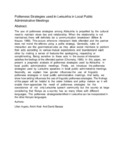| dc.contributor.author | Ingato, Lilian | |
| dc.contributor.author | Alati, Atichi | |
| dc.contributor.author | Barasa, David | |
| dc.date.accessioned | 2021-12-31T09:07:31Z | |
| dc.date.available | 2021-12-31T09:07:31Z | |
| dc.date.issued | 2020-09-17 | |
| dc.identifier.uri | https://doi.org/10.32996/ijllt.2020.3.9.10 | |
| dc.identifier.uri | https://al-kindipublisher.com/index.php/ijllt/article/view/444/408 | |
| dc.identifier.uri | http://ir-library.mmust.ac.ke:8080/xmlui/handle/123456789/1977 | |
| dc.description.abstract | The use of politeness strategies among Abiisukha is propelled by the cultural need to maintain close ties and relationship. When the relationship is not maintained, there will definitely be a communication breakdown (Billow & Krauss 1988). This occurs whenone interactant feels offended and the partner does not mend the offense using a polite strategy. Generally, rules of interaction are like grammatical rules as they allow social members to perform their acts according to various mutual expectations and tounderstand each other by making a sense of features like apologizing, requesting or complimenting. Being sensitive to these acts in the course of interaction satisfies the feelings of the offended partner (Chomsky, 1990). In this paper, we present a pragmatic analysis of politeness strategies used by Abiisukha in local public administrative meetings. Firstly, we introduce the politeness strategies used by Lwisukha speakers in local public administrative meetings. Secondly, we explain how gender influences the use of linguistic politeness strategies in local public administrative meetings. And lastly, we show how setting influences the use of linguistic politeness strategies. The findings of this paper will be helpful to the stake holders and policy makers as it will enable them appreciate the need of politeness strategies for the coexistence of not only Lwisukha speech community but the country at large considering that Kenya as a country has so many tribes with different languages. The politeness strategiesidentified in Lwisukha can be incorporated in the other Kenyan languages. | en_US |
| dc.language.iso | en | en_US |
| dc.publisher | InternationalJournal of Linguistics, Literature and Translation (IJLLT) | en_US |
| dc.subject | Politeness, Strategies,Lwisukha , Local, Public, Administrative, Meetings | en_US |
| dc.title | Politeness strategies used in Lwisukha in local public administrative meetings | en_US |
| dc.type | Article | en_US |

